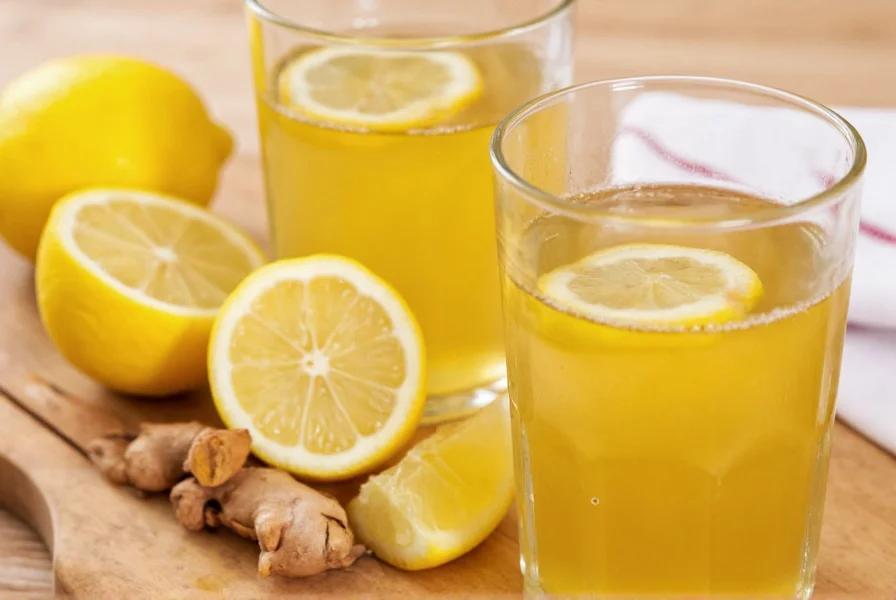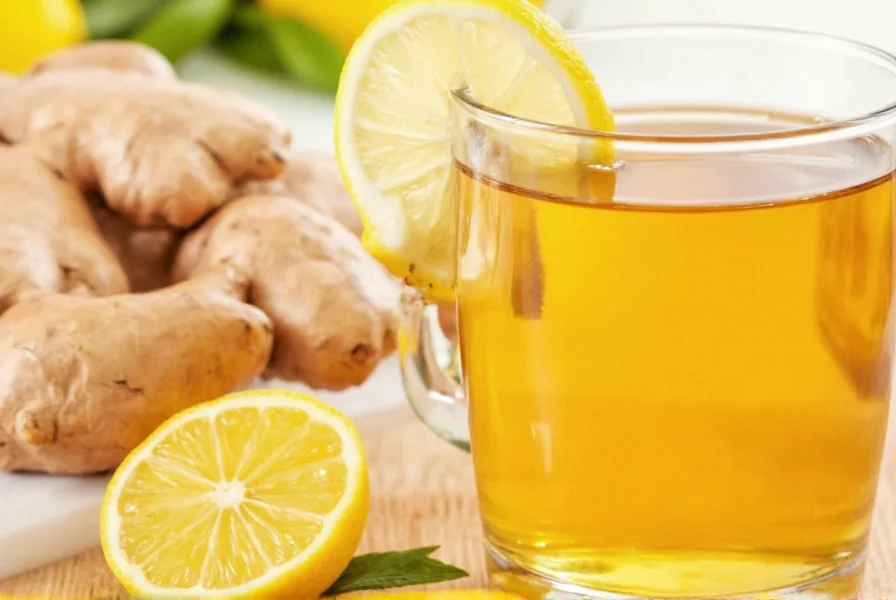Lemon honey ginger tea has gained popularity as a natural remedy for various health concerns. This simple yet powerful combination leverages the unique properties of three natural ingredients that have been used in traditional medicine for centuries. Unlike commercial products, homemade lemon ginger honey tea allows you to control the quality and proportions of each component, maximizing potential benefits while avoiding unnecessary additives.
The Science Behind Lemon Honey Ginger Tea Benefits
Each component of this tea brings distinct bioactive compounds that work together to create a beverage with multiple health-promoting properties. Understanding the individual contributions helps explain why this combination has stood the test of time across various cultures.
| Ingredient | Key Compounds | Primary Health Benefits |
|---|---|---|
| Ginger | Gingerol, Shogaol | Nausea relief, anti-inflammatory, digestive support |
| Lemon | Vitamin C, Flavonoids | Immune support, antioxidant protection, hydration |
| Honey (raw) | Polyphenols, Enzymes | Sore throat relief, antimicrobial properties, natural energy |
Detailed Health Benefits of Lemon Ginger Honey Tea
Immune System Support
The vitamin C in lemon works synergistically with the antioxidants in raw honey and the anti-inflammatory compounds in ginger to support immune function. Research published in the Journal of Food Science indicates that the combination of these ingredients creates a more potent antioxidant effect than any single component alone. This makes lemon ginger honey tea particularly valuable during cold and flu season as part of a comprehensive wellness strategy.
Digestive Health Improvement
Ginger's ability to accelerate gastric emptying has been documented in multiple clinical studies. When combined with lemon's citric acid and honey's prebiotic properties, this tea creates an ideal beverage for digestive support. Many people find relief from occasional indigestion, bloating, and nausea by drinking a cup of warm lemon honey ginger tea 20-30 minutes before meals. The warmth of the tea also helps stimulate digestive enzymes naturally.
Natural Sore Throat Relief
Raw honey's viscous texture coats the throat while its antimicrobial properties help combat pathogens. When combined with ginger's anti-inflammatory effects and lemon's vitamin C, this tea provides multi-faceted relief for sore throats. A study in the Archives of Pediatrics & Adolescent Medicine found honey to be more effective than placebo for nighttime cough and sleep difficulty associated with upper respiratory tract infections.
How to Make Authentic Lemon Ginger Honey Tea
Creating an effective lemon honey ginger tea requires attention to ingredient quality and preparation method. The following evidence-based recipe maximizes the bioactive compounds while preserving their potency:
Basic Recipe for Maximum Benefits
- Peel and thinly slice 1-2 inches of fresh ginger root
- Simmer ginger in 16oz (500ml) of filtered water for 10-15 minutes
- Remove from heat and let cool for 3-5 minutes (critical step - see below)
- Add the juice of half a fresh lemon
- Stir in 1-2 teaspoons of raw, unprocessed honey
- Enjoy warm, but not scalding hot
The brief cooling period before adding honey preserves the beneficial enzymes and compounds in raw honey that are destroyed at temperatures above 140°F (60°C). Similarly, adding lemon after removing from heat preserves more vitamin C, which degrades rapidly in boiling water.
Optimal Timing for Consumption
When you drink lemon honey ginger tea affects which benefits you'll experience most prominently:
- Morning consumption: Drink 20 minutes before breakfast to stimulate digestion and provide natural energy without caffeine
- During illness: Consume every 2-3 hours when experiencing cold symptoms for continuous soothing and immune support
- After meals: Helps with digestion, particularly after heavy or fatty meals
- Before bed: The calming effect may promote better sleep, though avoid if sensitive to citrus before sleeping
Scientific Evidence and Limitations
While lemon honey ginger tea offers several potential benefits, it's important to understand the current scientific evidence:
- Ginger has demonstrated effectiveness for nausea relief in multiple randomized controlled trials, particularly for pregnancy-related nausea and chemotherapy-induced nausea
- Honey shows documented benefits for cough suppression in children over 1 year old, though it should never be given to infants under 12 months
- Lemon provides vitamin C, but the amount in a single cup of tea is modest compared to eating the whole fruit
- Most research examines these ingredients individually rather than in combination
- Effects are generally mild and should complement, not replace, medical treatment for serious conditions
Important Considerations and Precautions
Lemon honey ginger tea is generally safe for most people when consumed in moderation, but certain considerations apply:
- Dental health: The citric acid in lemon can erode tooth enamel. Drink through a straw or rinse mouth with plain water afterward
- Blood thinning: Ginger may interact with blood-thinning medications. Consult your healthcare provider if taking anticoagulants
- Acid reflux: The citrus content may trigger symptoms in people with GERD or acid reflux conditions
- Honey caution: Never give honey to children under 12 months due to botulism risk
- Recommended daily amount: 1-3 cups per day is generally sufficient to experience benefits without potential side effects
Maximizing Your Lemon Ginger Honey Tea Experience
For those seeking to enhance the benefits of their daily tea ritual, consider these evidence-based tips:
- Use organic ingredients when possible to minimize pesticide exposure
- Add a pinch of black pepper to increase absorption of ginger's active compounds
- Try adding turmeric for additional anti-inflammatory benefits
- Use warm, not boiling water with honey to preserve beneficial enzymes
- Grate ginger rather than slicing for more surface area and stronger flavor extraction

Conclusion
Lemon honey ginger tea represents a simple yet powerful example of how traditional remedies often have scientific backing for their health benefits. When prepared properly with quality ingredients, this beverage can be a valuable addition to a healthy lifestyle. While not a cure-all, its combination of immune support, digestive benefits, and soothing properties makes it worth incorporating into your wellness routine. Remember that consistent, moderate consumption yields better results than occasional large quantities, and always consult with healthcare professionals about health concerns rather than relying solely on home remedies.
Frequently Asked Questions
How often should I drink lemon honey ginger tea for maximum benefits?
For general wellness, 1-3 cups daily provides optimal benefits without potential side effects. Morning consumption supports digestion, while drinking it when experiencing cold symptoms can provide soothing relief. Consistent daily consumption yields better results than occasional large quantities, as the bioactive compounds work cumulatively in the body.
Can lemon honey ginger tea help with weight loss?
While lemon honey ginger tea isn't a weight loss solution, it can support healthy weight management when combined with proper diet and exercise. The ginger may temporarily boost metabolism, and replacing sugary beverages with this tea reduces calorie intake. However, claims that it dramatically burns fat are exaggerated - its primary value for weight management is as a healthy alternative to high-calorie drinks.
What's the best time to drink lemon ginger honey tea for digestion?
For optimal digestive benefits, drink lemon honey ginger tea 20-30 minutes before meals. This timing allows the ginger to stimulate digestive enzymes and prepare your system for food intake. The warmth of the tea also helps relax the digestive tract. Some people also find benefit from drinking it after meals, particularly following heavy or fatty meals that may cause indigestion.
Is store-bought lemon ginger tea as effective as homemade?
Most store-bought lemon ginger teas contain significantly less active compounds than homemade versions. Commercial products often use ginger powder rather than fresh ginger, which has lower gingerol content, and may include artificial flavors instead of real lemon. For maximum benefits, homemade tea with fresh ingredients provides higher concentrations of bioactive compounds. If using store-bought, look for products with whole ginger pieces and real lemon peel rather than flavorings.
Can I drink lemon honey ginger tea if I have diabetes?
People with diabetes can enjoy lemon honey ginger tea with modifications. Reduce or eliminate the honey (which contains natural sugars) and consider using a small amount of stevia if sweetness is desired. The ginger and lemon components have minimal impact on blood sugar. Consult with your healthcare provider about appropriate consumption, as ginger may enhance the effects of certain diabetes medications.











 浙公网安备
33010002000092号
浙公网安备
33010002000092号 浙B2-20120091-4
浙B2-20120091-4